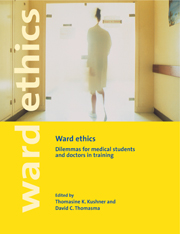Book contents
- Frontmatter
- Contents
- Acknowledgments
- List of contributors
- Prologue. Breaking the silence
- Letter from a young doctor
- Part I On caring for patients
- Section 2 Problems in truth-telling
- Section 3 Setting boundaries
- Part II On becoming a “team player”: searching for esprit de corps and conflicts of socialization
- Section 5 Argot, jargon, and questionable humor: assuming the mantle at the patient's expense
- Section 6 Making waves: questioning authority and the status quo
- Section 7 Perceiving misconduct and whistle-blowing: observing peers or superiors commit an act deemed unethical
- Epilogue: Using this book
- Glossary
- Index
Section 7 - Perceiving misconduct and whistle-blowing: observing peers or superiors commit an act deemed unethical
Published online by Cambridge University Press: 05 February 2015
- Frontmatter
- Contents
- Acknowledgments
- List of contributors
- Prologue. Breaking the silence
- Letter from a young doctor
- Part I On caring for patients
- Section 2 Problems in truth-telling
- Section 3 Setting boundaries
- Part II On becoming a “team player”: searching for esprit de corps and conflicts of socialization
- Section 5 Argot, jargon, and questionable humor: assuming the mantle at the patient's expense
- Section 6 Making waves: questioning authority and the status quo
- Section 7 Perceiving misconduct and whistle-blowing: observing peers or superiors commit an act deemed unethical
- Epilogue: Using this book
- Glossary
- Index
Summary
Professional regulation and self-regulation are essential ingredients in medicine. This regulation requires monitoring, not only of one's self, but also of one's peers. The responsibility to report risks that colleagues and other health professionals may pose to the public lies in the obligation to prevent serious foreseeable harm. Since disclosing often comes with considerable personal cost, how vigilant should trainees be expected to be in disclosing such information? If, for example, trainees perceive professionals abusing drugs or alcohol, how should this be handled? If they are part of a team where patients are mistreated, is there a way to improve that situation? If they are asked to cover up a mistake that has been made, what are the options? When, if ever, is it appropriate to step in and take action?
The power imbalance between supervisors and trainees that makes perceived misconduct and whistle-blowing so complicated also exerts a powerful force in the area of clinical research. How should authorship be determined? How should coauthors, consultation, mentoring, editing, etc. be expressed? What are the obligations of students? Of supervisors? When should trainees challenge or report misconduct?
- Type
- Chapter
- Information
- Ward EthicsDilemmas for Medical Students and Doctors in Training, pp. 215Publisher: Cambridge University PressPrint publication year: 2001

